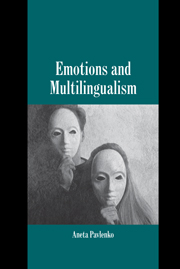Book contents
- Frontmatter
- Contents
- List of Tables
- Preface
- 1 Languages and emotions: What can a multilingual perspective contribute?
- 2 Emotions in the study of multilingualism: Framing the questions
- 3 Vocal level: Is the lady angry?
- 4 Semantic and conceptual levels: The bilingual mental lexicon
- 5 Discursive level: I feel zhalko tebia bednogo
- 6 Neurophysiological level: His coeur is where his feelings dwell
- 7 Social cognition: I no longer wanted to speak German
- 8 Emotions and multilingualism: An integrated perspective
- Appendix A Bilingualism and emotions webquestionnaire
- Appendix B Transcription conventions
- References
- Author Index
- Subject Index
6 - Neurophysiological level: His coeur is where his feelings dwell
Published online by Cambridge University Press: 11 November 2009
- Frontmatter
- Contents
- List of Tables
- Preface
- 1 Languages and emotions: What can a multilingual perspective contribute?
- 2 Emotions in the study of multilingualism: Framing the questions
- 3 Vocal level: Is the lady angry?
- 4 Semantic and conceptual levels: The bilingual mental lexicon
- 5 Discursive level: I feel zhalko tebia bednogo
- 6 Neurophysiological level: His coeur is where his feelings dwell
- 7 Social cognition: I no longer wanted to speak German
- 8 Emotions and multilingualism: An integrated perspective
- Appendix A Bilingualism and emotions webquestionnaire
- Appendix B Transcription conventions
- References
- Author Index
- Subject Index
Summary
It was a great surprise to me, one of many surprises of my life, that when I began speaking English, I felt freer to express myself, not just my views but my personal history, my quite private drives, all the thoughts that I would have found difficult to reveal in my mother tongue. It seemed that the languages of my childhood and adolescence – Polish and Russian – carried a sort of mental suppression. By the time I was 25, an American, my infancy in English had ended and I discovered that English, my stepmother tongue, offered me a sense of revelation, of fulfillment, of abandonment – everything contrary to the anxiety my mother tongue evoked.
(Jerzy Kosinski, in Teicholz, 1993: 125)The first non-native speaker to win the most prestigious US literary prize, the National Book Award, Jerzy Kosinski was born in 1933 in a family of Russian Jews in Poland. In 1939, two months after the German invasion, the six-year-old Jerzy got separated from his family. He spent the next six years wandering through the Polish countryside, believing that he was either a Gypsy or a Jew and afraid of being discovered by the German authorities. Three years into the journey, the constant fear, flight, and hunger, as well as the death and atrocities witnessed by the boy, rendered him mute. When in 1945 his parents found him in an orphanage, Jerzy was a half-mad, terrified, speechless child; it took him two years to regain speech (Teicholz, 1993).
- Type
- Chapter
- Information
- Emotions and Multilingualism , pp. 151 - 191Publisher: Cambridge University PressPrint publication year: 2006



